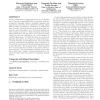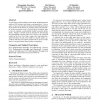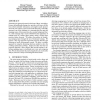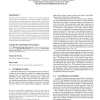155
Voted
CIKM
2011
Springer
14 years 2 months ago
2011
Springer
Social (or folksonomic) tagging has become a very popular way to describe content within Web 2.0 websites. However, as tags are informally defined, continually changing, and ungo...
104
Voted
CIKM
2011
Springer
14 years 2 months ago
2011
Springer
In many domains, such as bioinformatics, cheminformatics, health informatics and social networks, data can be represented naturally as labeled graphs. To address the increasing ne...
137
Voted
CIKM
2011
Springer
14 years 2 months ago
2011
Springer
Traditional information retrieval techniques based on keyword search help to identify a ranked set of relevant documents, which often contains many documents in the top ranks that...
129
Voted
CIKM
2011
Springer
14 years 2 months ago
2011
Springer
We present a hybrid method to turn off-the-shelf information retrieval (IR) systems into future event predictors. Given a query, a time series model is trained on the publication...
93
Voted
CIKM
2011
Springer
14 years 2 months ago
2011
Springer
137
Voted
CIKM
2011
Springer
14 years 2 months ago
2011
Springer
Streaming user-generated content in the form of blogs, microblogs, forums, and multimedia sharing sites, provides a rich source of data from which invaluable information and insig...
127
Voted
CIKM
2011
Springer
14 years 2 months ago
2011
Springer
A growing number of applications are built on top of search engines and issue complex structured queries. This paper contributes a customisable ranking-based processing of such qu...
134
Voted
CIKM
2011
Springer
14 years 2 months ago
2011
Springer
We consider the problem of link prediction in signed networks. Such networks arise on the web in a variety of ways when users can implicitly or explicitly tag their relationship w...
106
click to vote
CIKM
2011
Springer
14 years 2 months ago
2011
Springer
This paper describes how to make use of e-books that look like printed books in a knowledge network. After an overview of digitalization efforts and current digital library initia...
132
Voted
CIKM
2011
Springer
14 years 2 months ago
2011
Springer
Today, a number of algorithms exist for constructing tag hierarchies from social tagging data. While these algorithms were designed with ontological goals in mind, we know very li...




